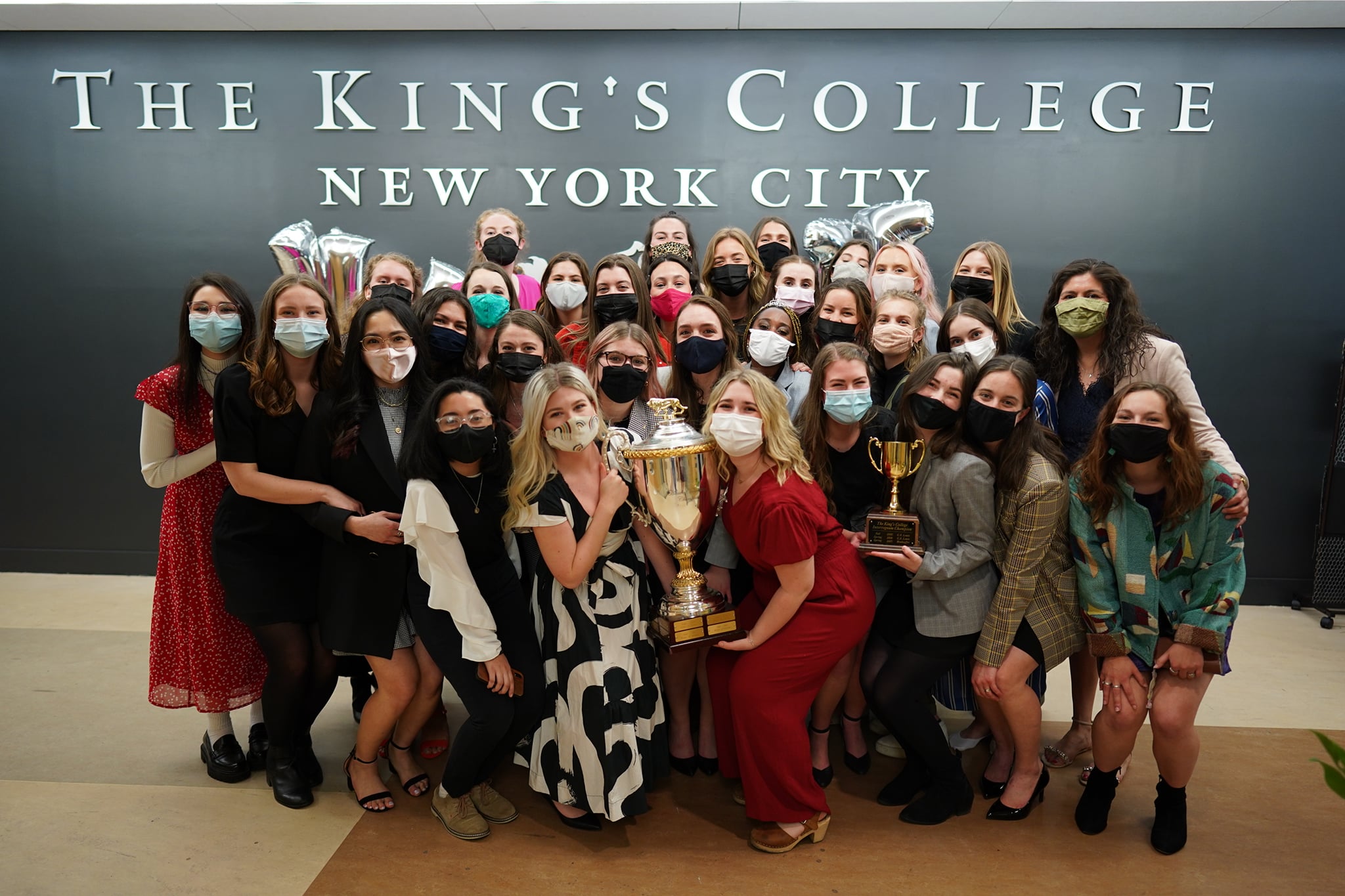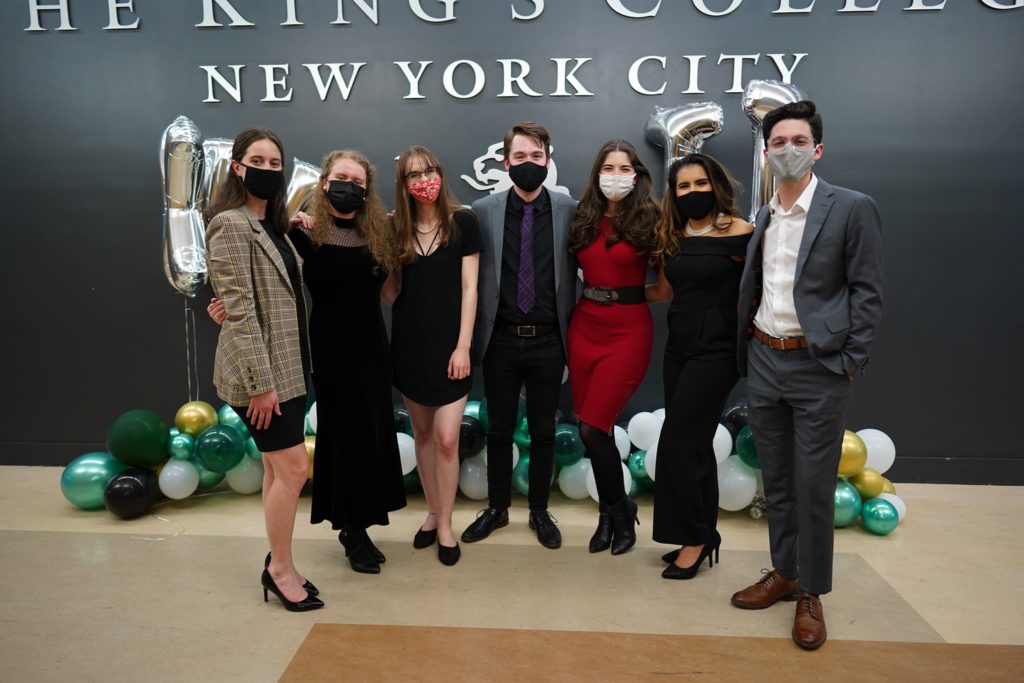Recapping Interregnum XVII: Reconciliation
During Interregnum conferences, all classes pause and students compete in a variety of creative efforts around the theme, with reference to assigned texts.

Inaugurated in 2004, Interregnum is a signature event at The King’s College inquiring into a “theme of abiding philosophical importance and public salience,” to quote the description in the course catalog. During Interregnum conferences, all classes pause and students compete in a variety of creative efforts around the theme, with reference to assigned texts. Every full-time student is required to participate in or at least attend a number of Interregnum events.
The Interregnum Committee for the 2020-21 year included the following: Micah Long (Humanities ’21) as chair, Ellen Coy (English ’22) as vice chair, Catherine Blanco (PPE ’22) as competitions coordinator, Emma Powell (MCA ’22) as academics coordinator, Ravyn Carico (Business ’22) as events coordinator, Chris Davis (PPE ’22) as communications coordinator, Kaylee Vroon (MCA ’23) as Interregnum Omnium, Director of Residence Life Leticia Mosqueda as staff advisor, and Associate Professor of Politics Dr. David Tubbs as faculty advisor.

The Interregnum XVII Committee chose Reconciliation as this year’s theme, drawing from Let Justice Roll Down (John Perkins); Gilead (Marilynne Robinson)l; the biblical book of Hosea; and two speeches, Abraham Lincoln’s Second Inaugural Address and Dr. Martin Luther King Jr.’s “What is Your Life’s Blueprint?”
Like last year, Interregnum XVII took place over the course of a fall conference (November 13-14, 2020) and a spring conference (April 7-9, 2021). Summing up results from both conferences, the House of Margaret Thatcher took the Interregnum Cup, and the House of Queen Elizabeth I and the House of Corrie ten Boom tied for second.
Last year’s spring competition, hosted in April 2020, was entirely virtual as the campus had just shifted to online operations and teaching. This year most competitions took place in person, with some modifications. A few debate rounds were hosted online, the opening lecture by Dr. Miroslav Volf was delivered over Zoom, and students split up into different classrooms by House to watch performance livestreams. Except for Random Theme Debate, which took place outside in Battery Park, all live events were streamed on Zoom so remote students could join.
Reflecting on this year’s Interregnum, Long said, “We’re really glad we got the chance to do Interregnum in a semi-normal way. It seems like it brought people together. It was one of the times this year when I saw the community all excited about something.”

“During Interregnum, the campus transforms,” said Elaina Bals (English ’21), the Interregnum Liaison for the House of Truth. Students spend time connecting with each other informally; the business casual dress code is relaxed; there’s a special energy on campus. Bals added, “You have freshmen in the House and at first they don’t know what in the world Interregnum is. I really can’t tell them until they’re here and they have that feeling of how campus changes.”
Long said that hosting the events in a hybrid format “was like putting on two Interregnums, doing everything remotely and everything in person.” But the extra effort had its upsides: they were able to stream the final debate and the opening lecture to alumni and friends. This year’s committee also created a new Interregnum website open to students, staff, and faculty where they posted competition winners and faculty reflections on the theme.
The Fall Conference competitions were Academic Writing, Digital Art, Great Speech, and the 24-hour Film Festival.
Academic Writing prompted four students from each House to reflect on the question, “What, if any, are the difficulties in striving for justice while simultaneously promoting unity in the pursuit of Reconciliation?” through the lens of the two assigned speeches (King and Lincoln). The House of Queen Elizabeth I won this event.

Digital Art involved digitally re-contextualizing an element from one or more of the following artworks: Sir Peter Paul Rubens, The Reconciliation of Esau and Jacob, c. 1625-1628; Pablo Picasso, Celebration of Peace and Reconciliation (Le festin), c. 1934; Salvador Dalí, Crucifixion (Corpus Hypercubus), c.1954; Hale Aspacio Woodruff, The Building of Savery Library, c. 1942; and Josefina de Vasconcellos, Reconciliation (originally named Reunion), c.1977. All entries are posted on the Interregnum website. The House of Thatcher took first place in Digital Art with a re-contextualization of Pablo Picasso’s “Celebration of Peace and Reconciliation.”
Great Speech required students to deliver a live performance of a historic or contemporary speech related to the topic (costumes encouraged!). Speeches included Angela Merkel’s Commencement Address at Harvard University, Mary Church Terrell’s “What It Means to Be Colored in the Capital of the United States,” and Nelson Mandela’s “I Am Prepared to Die.” The House of Queen Elizabeth I took first.
For the 24-Hour Film Festival, Houses portrayed the “additional steps that must be taken, along with a sustained personal conviction, for two parties to reconcile,” drawing from themes within the Let Justice Roll Down text. The House of C.S. Lewis posted their winning entry to Instagram.
The Spring Conference began the evening of Wednesday, April 7, with a lecture from Dr. Miroslav Volf, the Henry B. Wright Professor of Theology at Yale Divinity School. In the lecture, Volf drew from his award-winning book Exclusion and Embrace and his academic career exploring the theology of forgiveness and unity to discuss “how to remain faithful to the message of the cross, which is forgiveness, while at the same time recognizing when significant wrong has been done.”

Matt Kaal (PPE ’09), an alumnus who virtually attended Volf’s opening lecture, said, “I very much appreciated how Dr. Volf tied his ‘phenomenology’ of reconciliation to the image of embrace depicted in Jesus’ parable of the prodigal son, where the father (who within the cultural context of the story has been profoundly wronged by his son’s behavior) embodies reconciliation by opening himself in the form of an active embrace of the son who had been lost to him. It is a really beautiful image, especially because any Christian can identify with it as a sinner who has been embraced by God.”
The Spring Conference competitions were Random Theme Debate, Parliamentary Debate, Creative Writing, Unprepared Lecture, and Performing Arts.
Random Theme Debate is a light-hearted event in which Houses try argue for an unlikely comparison (the speaker from one House might draw the topic, “Interregnum is like a chicken,” while the speaker from the opposing House might draw “Interregnum is like Reconciliation”). Topics this year included “NYC winter” “Student Body President Elections” and “mandatory quarantine.” The House of Corrie ten Boom won first place.
Creative Writing prompted Houses to create an epistolary short novel in a similar style to Gilead illustrating reconciliation (or its absence). The House of Truth won with a story written from the perspective of a mother writing to a child she gave up for adoption. “I’ve been having restless nights lately, my mind full of questions. I can’t help but hope that you would want to meet me someday.”
Performing Arts asked Houses to “illustrate the emotional toll it may take on an individual trying to maintain a spirit of Reconciliation in the midst of failure and despair. Show the tension of the ‘already and not yet’ reality of this life.” The House of Margaret Thatcher won with a dance choreographed to an original song.
Unprepared Lecture randomly assigned each House a different prompt based on the biblical text of Hosea, such as, “Hosea chapters 6, 10, 11, and 13 all mention cities and fortresses. How does Hosea use the city as a metaphor for Israel, and what is YWHW’s reaction to those sites?” The House of Susan B. Anthony placed first.
The Debate competitions follow the American Parliamentary format, with debaters assigned to argue for or against the provided motions (motions were drawn from assigned readings, current events, philosophical concepts, and school culture). The final debate motion read, “This house believes that the loss of safety, health, and even life can be justified for the sake of unity.” Watch the final debate between the Houses of Ronald Reagan and C.S. Lewis. The House of Ronald Reagan took first in the Parliamentary Debate event.
At the close of the Spring conference, Joseph Scibbe (Humanities ’21) said on Twitter,
Yesterday was my last Interregnum. I can’t do it again, I won’t have the option. If I go to grad school, I can take more finals, I can write more papers, I can have other meaningful discussions. But never again will I get to structure an entire year thinking about Compassion, Order & Chaos, Progress, or Reconciliation. I don’t know of anyone else that does this. It’s a uniquely King’s thing. Underclassmen, please don’t take it for granted.
What I do know is the ‘real’ winners of Interregnum are the students who participate and whose lives are changed, but also the communities who get us as members when we graduate. Thanks to Micah and every other committee member over the past four years who made this happen.
Featured image: The House of Margaret Thatcher celebrating their first place finish in the Interregnum Cup and House Cup. Images courtesy the Interregnum Committee. See the full photo album on Facebook.




